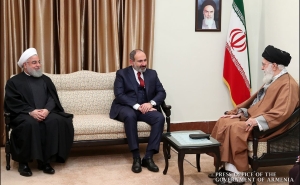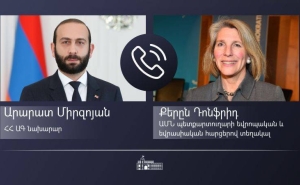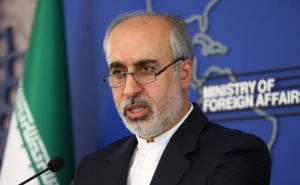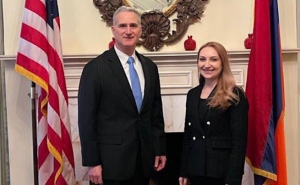US Actions Prove that Iran Nuclear Deal is Near

Last week the President of the United Stated had a meeting with the six members of the Gulf Cooperation Council (GCC), Bahrain, Oman, Kuwait, Qatar, UAE and Saudi Arabia at the Camp David. The timing of the visit, when the deadline for the Iran final nuclear agreement is approaching, caused number of logical questions on the real goals Obama pursued during the summit and on the extent he managed to fulfill those goals. Here an attempt is made to comment on the overt goals Obama pursued during the meeting as well as to refer to covert goals the US government aimed at by organizing the Gulf Cooperation Council Summit.
The main overt goal Obama pursued during the meeting was to assure the US "ironical commitment" to the Sunni governments of the Gulf States. Although the US government avoided to sign a NATO-like treaty that would formalize a defense pact with the United States (the fact that once more proves the US unwillingness to directly be engaged in Middle East chaos) in the joint-statement issued, the sides obliged "to work together to develop an integrated GCC defense capability against ballistic missiles, including an early warning system," with Obama pledging to take their partnership to another level of greater cooperation; the one that will include joint military exercises and training. In addition, Colin Kahl, the US national security advisor to the US Vice-President Joe Biden, tried to relax the fears of the GCC making the following comparison.
"GCC last year spent nearly 135 billion dollars on their defense, and the Saudis alone spent more than 80 billion dollars. In comparison, the Iranians spent something like 15 billion dollars on their defense," commondreams.org reports.
In spite of the US officials’ efforts to assure their support to GCC countries it is still a question of debate whether Obama managed to fulfill this major goal. Although Arab and U.S. officials involved in the Camp David meetings generally stated that the talks were constructive, mojahedin.org reports, the Gulf countries in the end did not get what they initially aimed at - a formal treaty guaranteeing the security promises. In addition the US refused to deliver more-advanced jet fighter, the F-35 to the Gulf countries they were interested in. The US officials explained the US unwillingness on the issue by the fact that the sale of the F-35 to the Gulf countries contradicted the US’s strategic alliance with Israel.
Another important goal Obama administration aimed to achieve by inviting Gulf Countries Summit was to get endorsement of his efforts to negotiate nuclear deal with Tehran. Here again one cannot state for sure that the US managed to reach what it aimed at especially if the following factors are considered. Only two of six GCC members (Qatar and Kuwait) were represented by their heads of state in the summit that was supposed to be top-level delegation from the Gulf Cooperation Council (GCC) countries. For example, Saudi Arabia’s foreign minister, Adel al-Jubeir, explained the King Salman absence at the summit by the necessity for him to stay in Riyadh and to focus on the Yemen cease-fire and humanitarian aid effort. Although Saudi official sources explained the king’s rejection to participate in the summit by the Yemen crisis and as they called it by "technical nature" of the conversations (the king felt the senior officials in the delegation, led by Crown Prince Mohammed bin Nayef, and including Defense Minister Prince Mohammed bin Salman, were better equipped to handle, Washington Post reports) in the United States, many experts as well as the Republican National Committee mocked the "no-show summit", labeling it "an embarrassing snub and a blow" to President Obama’s foreign policy.
The picture becomes more interesting if one tries to refer the covert goals Obama pursued during the summit. To be able to delve into the US covert motives to organize the summit with the Gulf States at this period of time one has to analyze the main emphasis Barack Obama made during the meeting.
The one possible conclusion one can derive from the analysis of those emphases is that Obama tried to secure himself by stating that nuclear agreement does not mean prevention of Iran’s possible "destabilizing" action in the region. During his first-ever interview to an Arabic language newspaper, Asharq Al-Awsat as well as in his remarks released in the State Department official webpage Obama made the following comments that are worth attention: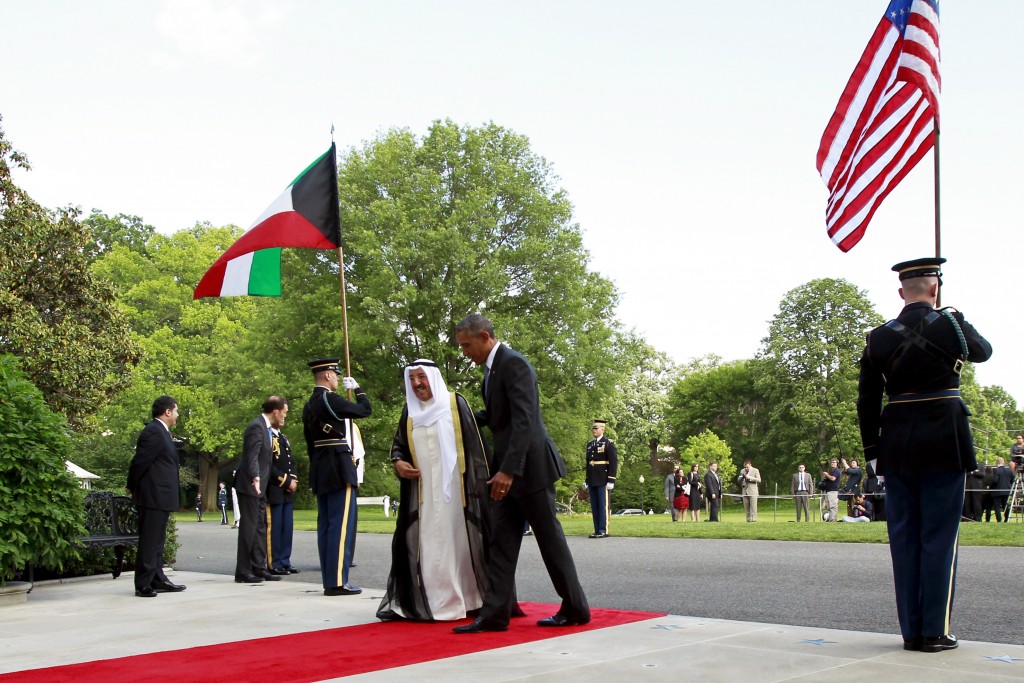
"There was a concern -- a concern that I share -- that even if we deal effectively with the nuclear issue that we will still have a problem with some of Iran’s destabilizing activities. And a number of them did express the concern that with additional resources through the reduction in sanctions, that was it possible that Iran would siphon off a lot of these resources into more destabilizing activity."
In sense by "sharing the concern" of Gulf states Obama wanted to make them have lower expectation from the nuclear deal noting that it cannot prevent Iran to abstain from the actions that contradict their interest in the region. In this way it seems that Obama tried to avoid being blamed by the Gulf countries for "Iran’s destabilization actions in the region" once the nuclear deal is signed.
Second, Obama delivered a clear message to Iran, which can be formulated in the following way: "nuclear deal does not mean "green light" for you to act in the region as you please". In this sense it was not by chance that after it the thesis began to circulate in the Iranian media according to which even if Iran and the West are going to reach a nuclear agreement, the relation between the US and Iran are not going to improve soon.
To conclude it should be stated that Obama’s both covert and overt motives to organize GCC can be characterized as "preventive" measures aimed at nullifying or at least minimizing possible negative consequences the Iran nuclear deal can have. In other words the summit was a kind of preparatory work for the final nuclear agreement that is inevitable to happen.
Other materials on this subject
- Putin Has Phone Talk With Iran President The political settlement in Syria was initiated by Russia, Turkey and Iran, who also vowed to act as guarantors of the settlement of the Syrian conflict.
- Iran Says Awaits US Response to Nuclear Talks 'Solutions' The negotiations, aimed at bringing the US back into the deal and Iran to full compliance with it, had stalled for about two months.
- US Prepares New Options on Iran in Case Negotiations on Nuclear Deal Fail "Because of the way that the Iranians approached and participated in the last round of talks, the President asked the national security team to be prepared in the event that diplomacy fails and to take...
- Iran Ready for Resultative Talks on Nuclear Deal — Top Diplomat "Despite the fact that the West is not implementing its commitments, Iran, for the sake of demonstrating its good will and with an eye of the lifting of the unilateral and illegal sanctions, is again ready...
- Iran Dismisses Idea of Talks with EU and U.S. to Revive 2015 Nuclear Deal The United States said it was disappointed but remained ready to “re-engage in meaningful diplomacy” and would consult with the other major powers to seek a way forward.
-
 17:08
17:08The regular session of the Anti-corruption Policy Council takes place in Jermuk
-
 15:05
15:05The Prime Minister sends congratulatory messages to the supreme leader of Iran and the President of Iran
-
 11:11
11:11Armenia sends earthquake aid to Turkey
-
 10:43
10:43Commemoration of the Pontiff St. Sahak Partev
-
 09:16
09:16Some roads are closed and difficult to pass in Armenia
-
 19:55
19:55Phone conversation of the Foreign Minister of Armenia with the U.S. Assistant Secretary of State for European and Eurasian Affairs
-
 18:30
18:30Prime Minister Pashinyan and President Khachaturyan meet
-
 18:20
18:20Ararat Mirzoyan with Co-Chairman of the OSCE Minsk Group of France Brice Roquefeuil
-
 17:01
17:01Humans could land on Mars within 10 years, Musk predicts
-
 16:45
16:45France, US urge 'immediate' end to Nagorno Karabakh blockade
-
 16:01
16:01Blockaded Nagorno Karabakh launches fundraiser to support quake-hit Syria
-
 15:59
15:59Earthquake death toll in Turkey rises to 18,342
-
 15:43
15:43Ararat Mirzoyan Held a Telephone Conversation with Sergey Lavrov
-
 15:06
15:06French president rules out fighter jet supplies to Ukraine in near future
-
 14:47
14:475 Day Weather Forecast in Armenia
-
 14:44
14:44President Vahagn Khachaturyan wrote a note in the book of condolences opened in the Embassy of Syria in Armenia
-
 14:20
14:20Azerbaijan’s provocations impede establishment of peace and stability – Armenian FM tells Russian Co-Chair of OSCE MG
-
 12:57
12:57France representation to OSCE: Paris calls on Azerbaijan to restore freedom of movement through Lachin corridor
-
 11:40
11:40Command of Kosovo forces highly appreciated preparation of Armenian peacekeepers
-
 10:16
10:16The United States withdrew from sanctions against Syria for six months the provision of assistance after the earthquake
day
week
month
Humidity: %
Wind: km/h


